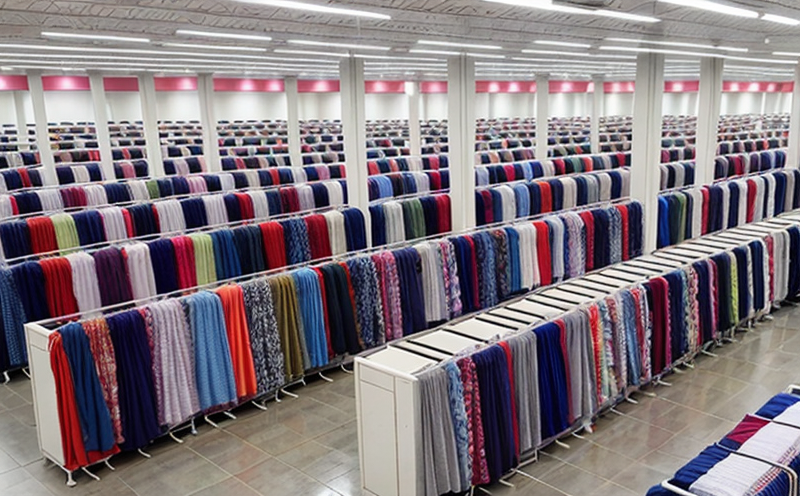ISO 11857 Fiber Composition Testing of Apparel for Export
The ISO 11857-2 standard provides a robust framework for determining the fiber composition in textile and apparel products. This service is vital for ensuring that exported goods meet international quality standards, particularly those required by import countries or specific trade agreements.
Our laboratory adheres strictly to this internationally recognized protocol, which involves several key steps from sample preparation through analysis and reporting. The process begins with the accurate identification of all fibers present in a given textile product, followed by quantitative determination using advanced instrumental techniques such as infrared spectroscopy (FTIR) or near-infrared spectrophotometry.
During specimen preparation, we ensure that samples are representative of the entire batch to avoid any bias in results. This step includes cleaning and conditioning fabrics according to specified conditions outlined in ISO 11857-2. Once prepared, these samples undergo rigorous testing where our experienced analysts utilize sophisticated equipment capable of detecting even trace amounts of various fiber types.
The resulting data from each test run are compiled into detailed reports that provide comprehensive information about the composition of fibers within your product. These reports serve multiple purposes including compliance verification with export regulations, quality assurance during production processes, and potential marketing advantages when selling directly to consumers who value transparency regarding material content.
By choosing our ISO 11857 fiber composition testing service for apparel destined for export markets, you can rest assured that your products meet all necessary requirements set forth by relevant international standards organizations like ISO. Our expertise in this area ensures accurate results every time so that you may focus on other aspects of business operations knowing that the integrity of your textiles is guaranteed.
Our team stays current with updates to ISO 11857 and other related standards to ensure our methodologies remain compliant and reliable. We offer competitive pricing alongside fast turnaround times, making it easy for businesses large and small to take advantage of this essential service without compromising on quality or timeliness.
For those involved in managing supply chains, conducting research within the textile industry, or purchasing raw materials for manufacturing purposes, understanding fiber composition is crucial. Our laboratory's proficiency in performing ISO 11857 tests not only meets regulatory requirements but also supports innovation and development efforts aimed at creating new generations of sustainable fabrics.
Understanding how different fibers behave under various conditions helps textile manufacturers optimize production processes while maintaining product quality standards. By leveraging our expertise in fiber composition analysis, you can gain insights into selecting appropriate raw materials for specific applications or improving existing products based on consumer preferences and environmental factors.
Applied Standards
- ISO 11857-2: Fiber composition of textile fabrics - Determination by infrared spectroscopy (FTIR)
- ASTM D1936: Standard test method for determination of fiber content in textiles using near-infrared spectrophotometry
The standards mentioned above are widely accepted globally and form the backbone of our testing protocol. They provide clear guidelines on sampling, preparation methods, instrumentation settings, and interpretation criteria necessary to achieve accurate results.
Benefits
Compliance with international standards is crucial for any business engaging in cross-border trade or seeking certification from recognized bodies. By partnering with us for ISO 11857 fiber composition testing, you ensure that your products adhere to these stringent requirements.
- Avoid costly recalls and reputational damage due to non-compliance issues
- Gain competitive advantage by meeting high-quality expectations set forth by buyers or end-users
- Ease of doing business with compliant suppliers who can deliver consistent quality products
- Access to broader markets where strict regulations govern textile imports and exports
In addition, our services contribute significantly towards sustainable practices within the textile industry. Understanding fiber compositions allows manufacturers to make informed decisions about sourcing eco-friendly materials or developing innovative green technologies.
Use Cases and Application Examples
Determining compliance with textile labeling laws in countries like China, Japan, or the European Union where accurate fiber content is mandatory for consumer safety.
Verifying claims made about recycled content in clothing lines to ensure they meet green certification requirements such as GRS (Global Recycled Standard).
Developing new blends of fibers that offer improved performance characteristics while maintaining cost-effectiveness for manufacturers.
Investigating discrepancies between supplier and manufacturer specifications to identify potential quality control issues early on in the supply chain.





